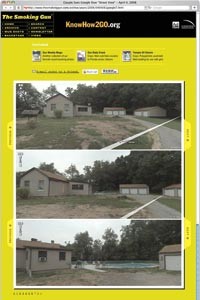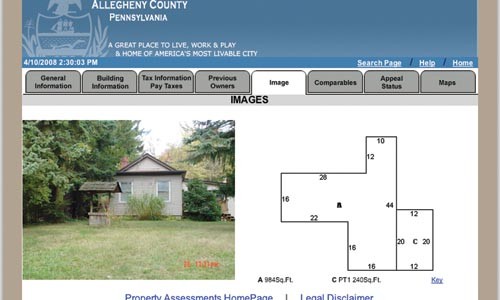When Christine and Aaron Boring bought their $163,000 house on Oakridge Lane in the North Hills in 2006, they assumed the 1.8 acre plot at the end of a lane marked "private" would be their haven. And, presumably, it was -- until they made national headlines by filing a lawsuit against tech behemoth Google.
The ubiquitous search engine launched Street View in May of 2007 as part of Google Maps. The program allows users a street-level view of houses, businesses and anything else captured by Google's cameras, adding a real-world visual component to the mapping function. The images are captured by a camera-topped van that tours neighborhoods.
Among the images collected was a photo of the Boring home. In the suit, the Borings contend that their privacy has been invaded and that the Google vehicle trespassed on their street. The suit says that "revealing this information has caused Plaintiffs mental suffering and diminished the value of their property." The suit demands that the images be removed, and that Google pay them damages.
"It's scary having too much out on the Web, considering that the Internet provides for mass distribution for the whole world, that includes people with all good and evil motivation," says Dennis Moskal, attorney for the Borings. (The Borings themselves have shunned media contact.)
Moskal says the suit is about much more than just a couple in Franklin Park who want to be left alone. Google, he says, plowed ahead with the Street View technology without considering the human costs. "Google is hoping that just by after the fact using reactive measures, they won't have to make the more costly proactive measures," he says.
Google is keeping mum about the specifics of the suit, issuing a statement that reads: "There is no merit to this action. It is unfortunate litigation was chosen to address the concern because we have visible tools such as a YouTube video to help people learn about imagery removal and an easy-to-use process to facilitate image removal."
Indeed, since the suit was filed, the photo of the Boring home has been removed from Street View. You can still see their neighbors' houses and a covered boat, but the Boring address yields a black screen and the explanation, "This image is no longer available."
"The process of going through imagery removal is pretty easy," says Google spokesman Larry Yu. Every image has a button marked "Street View Help" which leads to a screen with a prominent "Report Inappropriate Image" page. Users are given a chance to request images be pulled down if they contain inappropriate content or infringe on privacy.
"If someone wants to take down imagery of a home, we'll honor it, but we'll want to make sure it's the homeowner," Yu says. Google will seek verification from a user reporting an image that they are, in fact, affected adversely by the image; it takes about 48 hours to get an image removed. While he won't reveal specific figures, Yu says the number of takedown requests is quite small.
Yu also maintains that Street View images are taken only from public right-of-way, although Franklin Park public works supervisor Ronald Merriman says that Oakridge Lane is indeed designated private, which means that the borough isn't responsible for maintenance.
"We also appreciate that there's going to be people who have different thresholds of comfort," Yu says. Street View is highly careful, he says, not to reveal locations that need to remain hidden, such as shelters for battered women. But for the most part, "We don't want to make a judgment one way or the other. We'd rather publish the imagery and make it easy for people to let us know if they're unacceptable."
But nothing ever really goes away on the Internet. For one thing, images of the Boring home have been public for years on the county real-estate assessment site. Once the Borings filed their suit, moreover, gossip site The Smoking Gun archived a screen grab of the Street View with the Boring home included, just in case you'd like to check up on how clean the Borings keep their in-ground pool, for instance, or what direction their satellite dish is pointed.
The irony of making news in order to protect one's privacy, of course, is not lost on Moskal. "They have the courage to face up to Google," he says of the Borings. "I think the problem with the average person reading the story is that they see it as the Borings versus Google, but in reality it's you and I, it's everyone. ... This case is a face-off between big-business technology advances and the privacy interest of the individual." As for the county's real-estate site, Moskal says his client "doesn't concede the right of the county to have taken pictures of their house," either.
While the Borings are the first private citizens to sue over Street View, it's not the first time the mapping site has gotten into hot water. The photo vans took images from the Fort Sam Houston Army base in Texas. The images were posted, and "that was bad judgment used," concedes Yu. The images were removed quickly.
"[The Boring's] victory would have a big ramification," says Guilherme Roschke, an attorney with the Electronic Privacy Information Center, a Washington D.C.-based civil-liberties think tank. And if nothing else, filing the suit "does raise this issue of who is Google to go around photographing everyone and everything and turning it into their product.
"Their suit isn't just about the fact that their image was put up, it's about the creepy fact that their privacy was invaded," says Roschke. "They took special efforts and paid extra to get the kind of privacy that they wanted, and all that was brought to naught."
The suit, in claiming that "the invasion on Plaintiff's seclusion was substantial and highly offensive to a reasonable person," relies on the "intrusion upon seclusion" privacy tort, which provides protection against loss of privacy in a situation where a person has a reasonable expectation of privacy.
To prevail, says Roschke, the suit must prove that "the intrusion [would] be highly offensive to a reasonable person.
"They might have a hard time showing that," Roschke adds. Although the Borings "did take special steps to protect their privacy," by buying a house on a private street, the intrusion "has to be highly offensive to the average person."
Privacy, says Michael Madison, a University of Pittsburgh law professor who specializes in Internet law, is like an onion: "There are layers. The core of your privacy expectation is inside your home, in your bedroom or bathroom. You have a lesser expectation in your living room, still lesser in your front yard.
"I understand why they're creeped out," he says. "Legally speaking, does being creeped out mean a legal judgment of $25,000 or more?
"Call Google! Google's not hard to find," Madison advises. "That's clearly the place to start. By escalating the dispute with the lawsuit, they've blown whatever possible privacy they had."















